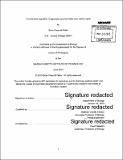| dc.contributor.advisor | Matthew Vander Heiden. | en_US |
| dc.contributor.author | Fiske, Brian Prescott | en_US |
| dc.contributor.other | Massachusetts Institute of Technology. Department of Biology. | en_US |
| dc.date.accessioned | 2015-09-17T19:00:43Z | |
| dc.date.available | 2015-09-17T19:00:43Z | |
| dc.date.copyright | 2015 | en_US |
| dc.date.issued | 2015 | en_US |
| dc.identifier.uri | http://hdl.handle.net/1721.1/98628 | |
| dc.description | Thesis: Ph. D., Massachusetts Institute of Technology, Department of Biology, 2015. | en_US |
| dc.description | Cataloged from PDF version of thesis. | en_US |
| dc.description | Includes bibliographical references. | en_US |
| dc.description.abstract | Rapid cell proliferation is characteristic of many biological systems, including cancer, normal development, and immune responses. At a basic level, proliferation requires that a cell synthesize a new copy of itself, with cell metabolism supplying the building blocks for new proteins, nucleic acids and lipids. Cancer and other proliferating cell types exhibit "aerobic glycolysis" characterized by elevated glucose uptake and conversion of glucose to lactate even in the presence of oxygen. Aerobic glycolysis is associated with anabolic reactions to generate new cellular material, but how aerobic glycolysis supports proliferative metabolism is not well understood. Pyruvate kinase (PK) catalyzes the last step in glycolysis, and while there is no evidence that PK activity is limiting for glycolysis, all proliferating cells express the PKM2 isoform of PK that is unique in having regulated activity which is decreased in the context of cellular proliferation. The simultaneous requirement for increased aerobic glycolysis and expression of the PKM2 isoform that is inhibited by growth signaling is a paradox, and it is unclear how elevated glucose metabolism enables rapid proliferation yet also requires decreased PKM2 activity. This thesis will explore two potential explanations for this paradox. The first hypothesizes the existence of an undiscovered enzyme that catalyzes a PK-like reaction, resolving the paradox by aligning increased flux through glycolysis with increased or unchanged activity of the PK step. The second hypothesis explores how PKM2 expression and PK inhibition supports proliferation by increasing serine synthesis from upstream glycolytic intermediates. This diverts one-carbon units into the folate pool to generate nucleotides via phosphoserine inhibition of SHMT1-mediated serine synthesis and one-carbon "wasting" in some cancer cells. We will also consider the reciprocal question of how folate one-carbon pool status in turn may regulate both PKM2 activity and glycolytic serine biosynthesis. The ability of PKM2 regulation to control folate metabolism for nucleotide synthesis explains for the first time at a mechanistic level one way that aerobic glycolysis promotes proliferative metabolism. | en_US |
| dc.description.statementofresponsibility | by Brian Prescott Fiske. | en_US |
| dc.format.extent | 159 pages | en_US |
| dc.language.iso | eng | en_US |
| dc.publisher | Massachusetts Institute of Technology | en_US |
| dc.rights | M.I.T. theses are protected by copyright. They may be viewed from this source for any purpose, but reproduction or distribution in any format is prohibited without written permission. See provided URL for inquiries about permission. | en_US |
| dc.rights.uri | http://dspace.mit.edu/handle/1721.1/7582 | en_US |
| dc.subject | Biology. | en_US |
| dc.title | Coordinated regulation of glycolysis and the folate one-carbon cycle | en_US |
| dc.type | Thesis | en_US |
| dc.description.degree | Ph. D. | en_US |
| dc.contributor.department | Massachusetts Institute of Technology. Department of Biology | |
| dc.identifier.oclc | 920672314 | en_US |
